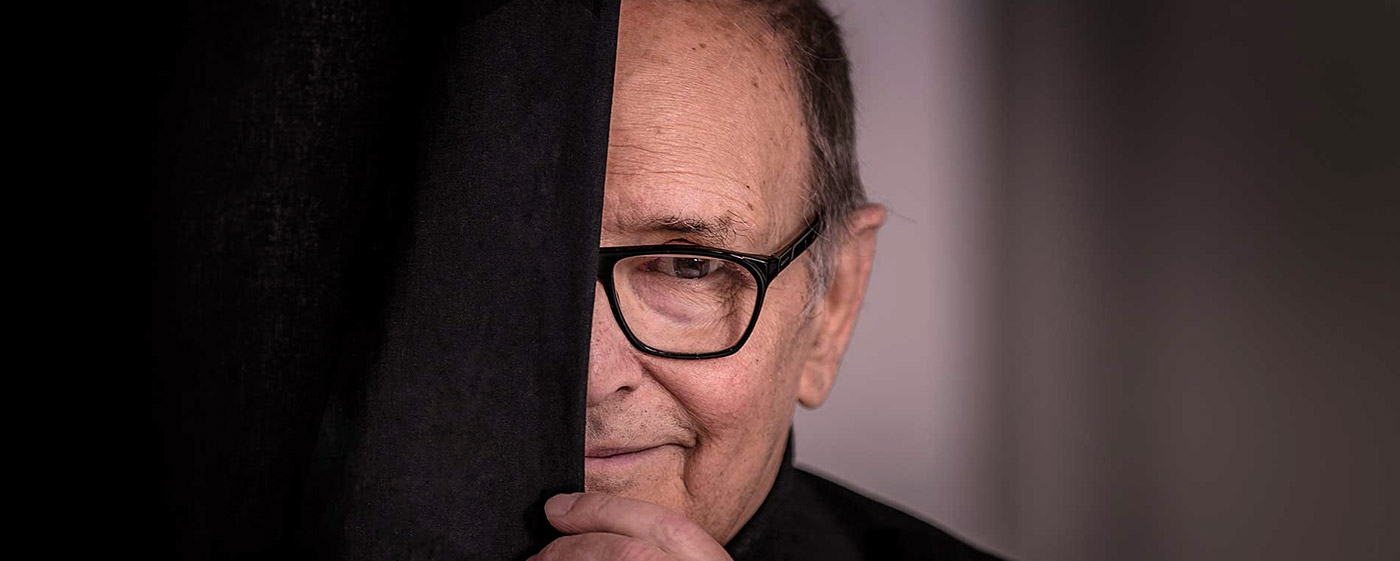The Sound of Cinema
What would cinema be without Ennio Morricone? The film world has been asking that since his first film composition in 1961. Now it must live on without him. Ennio Morricone died this year at the age of 91 and leaves film history with an incomparable musical legacy.

Ennio Morricone was born in Rome in 1928. His father was a musician and quickly recognised his son’s inherited musical talent. Ennio composed his first pieces at only six years old, while already at twelve, his parents sent him to the conservatoire, where he learned to play the trumpet. He completed his studies in half the time, yet the heart of this natural talent had been yearning for something different- composing.
In the first few years after his training he earned his money as a jazz trumpeter in night clubs in Rome, before he got jobs in the theatre and in the record industry. Fora time, he worked at the Italian broadcaster RAI as a music assistant. He arranged songs for the most famous opera singer in the world back in the 50s, Mario Lanza.
“A Film Maker Must Ask Me”
Lanza was making films in Hollywood at the time – perhaps that was the gateway to the film industry for Ennio Morricone. He was indeed taken on by more and more directors and his first film composition was heard in 1961 in the Italian Western The Fascist. His international breakthrough came four years later with his soundtrack to Sergio Leone’s Fistful of Dollars with a young Clint Eastwood.
His schoolfriend Sergio gave him contracts for two further Westerns which made film history not least because of Morricone’s unforgettable music: The Good the Bad and the Ugly and Once Upon a Time in the West. Who can forget the haunting sound of the mouth organ from actor Charles Bronson, that sends a shiver down anyone’s spine? This picture did not just catapult director Leone into the film pantheon, but also the composer Morricone as the musical alter ego of the classic spaghetti western became a cult figure.
An ideally matched team then. Ennio’s music is fundamental to Leone’s films, so from that moment on he composed the soundtrack for all of his friend’s productions.
Ennio Morricone was responsible for the music in over 500 films and won numerous international awards.
Over 500 Films
He also worked for many other well-known directors and that way distanced himself from the reputation of being the “Spaghetti Western“ composer: films by Pier Paolo Pasolini, John Carpenter, Brian de Palma, Bernardo Bertolucci and Quentin Tarantino, to name a few, carry his musical signature. Eventually, Ennio Morricone was responsible for the music in over 500 films. But he was always modest – he once said with a wink: “If you think what Bach composed and how much Mozart did in 33 years, you can see that I have not been that busy by comparison.“
Late Recognition
He received countless international awards for his work, but he had to wait a long time for the Oscar, the supreme prize. He won it, long overdue after seven nominations, in 2016 for Tarantino’s The Hateful Eight. However, he had also already received the honorary Oscar for his life’s work in 2007. He had composed many unforgettable pieces worthy of an Oscar for posterity long before that. Gabriel’s Oboe from Roland Joffés Drama The Mission is, according to American Film Institute, one of the best film music compositions of all time. The melody Chi Mai from Georges Lautner’s The Professional and Deborah’s Theme from Once upon a Time in America leave no film enthusiast’s ears untouched.
However, let’s go back to the start of his career where it was already clear: the harmonica of the mysterious stranger in Once Upon a Time in the West becomes the main figure of the film, whereby Morricone shows the overwhelming importance of music in film as in almost no other picture in film history.
The Key to Success
Great colleagues of Morricone, like John Williams, Hans Zimmer, James Horner, John Barry or Howard Shore, who made films like Jaws, Pirates of the Caribbean, Titanic, Out of Africa and Lord of the Rings with their music, should also be highly acknowledged here. However, Ennio Morricone and his completely unique composing style make him the most unmistakable film composer of all time, who was not able to hide his Italian roots in any of his melodies. Arrivederci, Ennio Morricone. You will be missed.






